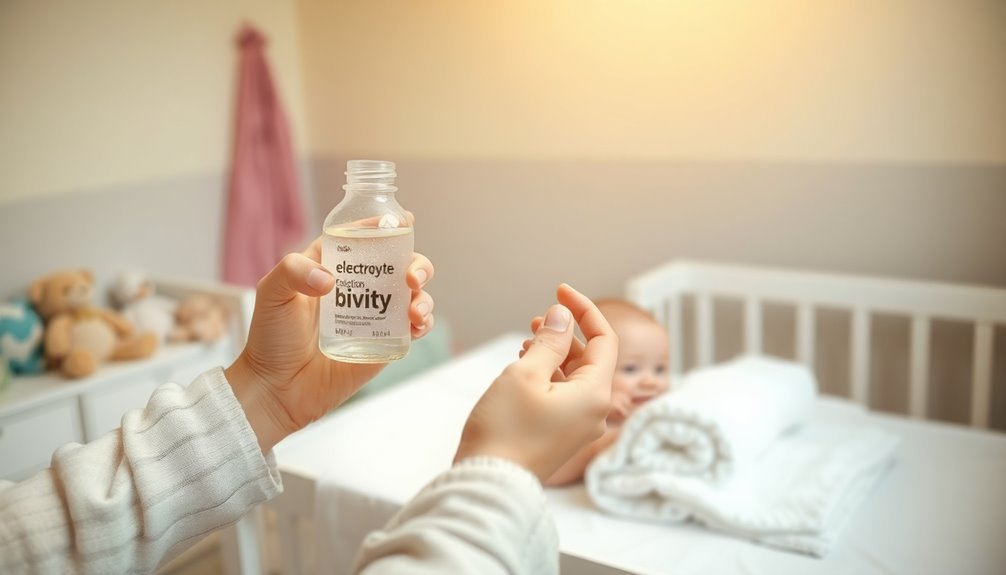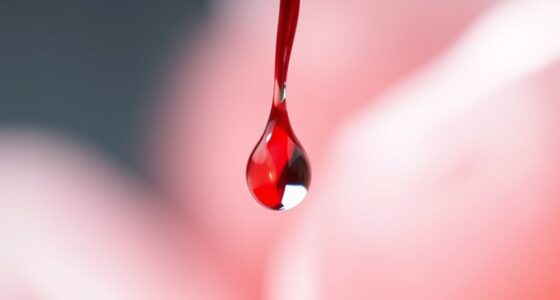If your baby has diarrhea, keep an eye on hydration. Offer oral rehydration solutions, which replenish lost fluids and electrolytes after each watery stool. The BRAT diet—bananas, rice, applesauce, and toast—can help as well. Don't forget about probiotics in plain yogurt, too! It's essential to monitor for signs of dehydration, like fewer wet diapers or lethargy. Want to know more home remedies and tips to help your little one feel better? Just keep going!
Key Takeaways
- Hydration is crucial: Use Oral Rehydration Solutions (ORS) to replenish fluids and electrolytes after each large watery stool.
- BRAT diet: Introduce bananas, rice, applesauce, and toast to help soothe the digestive system during diarrhea.
- Probiotics: Plain yogurt containing probiotics can help restore healthy gut bacteria and improve digestion.
- Frequent diaper changes: Change diapers often to prevent rashes and keep the skin dry and irritation-free.
- Monitor for dehydration: Watch for signs like dark urine, dry mouth, and fewer wet diapers and seek medical attention if symptoms worsen.
Understanding Diarrhea in Babies
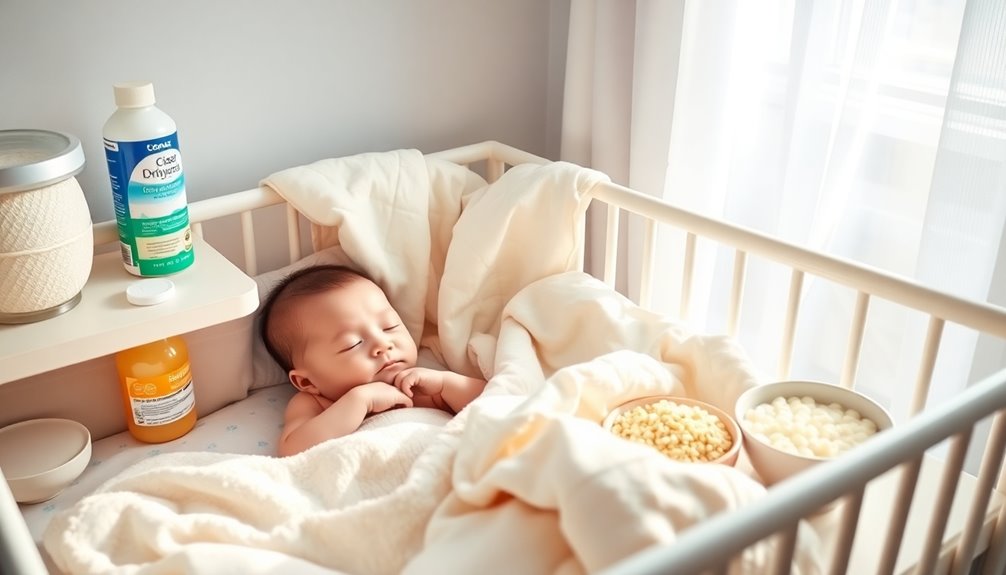
Diarrhea in babies can be concerning for any parent. It's defined as having three or more watery or very loose stools in a day, signaling a significant change from normal bowel movements.
You might notice increased stool frequency and changes in consistency, which are common signs of dehydration. Keep an eye out for fewer wet diapers or a dry mouth, as these can indicate your baby needs more fluids.
Breastfed babies often experience less diarrhea due to the protective antibodies in breast milk.
To prevent dehydration, guarantee your little one stays hydrated, and consult a pediatrician if diarrhea persists for more than a few days or if severe symptoms like high fever or blood in the stool arise.
Common Causes of Diarrhea in Infants

When your baby experiences diarrhea, understanding the underlying causes can help you address the issue more effectively.
One common cause is viral gastroenteritis, often referred to as the stomach flu, which generally leads to temporary symptoms.
Bacterial infections, like those caused by Salmonella or E. coli, can also result in diarrhea and may lead to more severe issues, such as bloody stools.
Additionally, changes in diet, such as introducing solid foods or switching between breast milk or formula, can upset your baby's digestive system.
Don't forget that antibiotics prescribed for other health issues can disrupt normal gut flora, causing diarrhea as a side effect.
It's essential to keep an eye on your baby to prevent dehydration amidst these common causes.
Recognizing Signs of Dehydration

When your baby has diarrhea, it's essential to watch for signs of dehydration.
Keep an eye on their urine output and look for symptoms like a dry mouth or unusual fussiness.
Recognizing these indicators early can help you respond quickly to protect your little one's health.
Dehydration Symptoms to Watch
Recognizing the signs of dehydration in your baby is crucial for their health, especially during episodes of diarrhea.
Watch for fewer wet diapers—less than six in 24 hours is concerning. A dry mouth and dark yellow urine are also key signs of dehydration.
If your baby cries without producing tears or has a sunken soft spot on their head, these could indicate a more severe situation.
Additionally, lethargy, confusion, or unusual fussiness can signal dehydration in infants, requiring immediate medical attention.
Keep an eye on their breathing patterns; hard or fast breathing can further highlight dehydration.
Staying alert to these signs guarantees you can act promptly to protect your baby's well-being.
Assessing Urine Output
How can you tell if your baby is dehydrated? One of the key indicators is urine output. If your baby is producing fewer than six wet diapers in a 24-hour period, it's a red flag.
Pay attention to the color of the urine too; dark yellow urine suggests dehydration, while normal urine should be pale yellow. Alongside this, watch for a dry mouth and sunken eyes. These signs often accompany decreased urine output in infants.
Another critical sign is a sunken soft spot on your baby's head, known as the fontanelle. This can indicate significant dehydration and requires immediate medical attention.
Monitoring these signs can help you act quickly if your baby's diarrhea leads to dehydration.
Monitoring Baby's Behavior
Monitoring your baby's behavior is just as important as keeping an eye on their urine output.
Watch for signs of dehydration, such as fewer than six wet diapers in 24 hours and dark yellow urine, indicating insufficient fluid intake. A dry mouth, lack of tears when crying, and lethargy are critical indicators that your baby may need immediate attention.
Additionally, look for unusual behaviors like excessive sleepiness or hard breathing. A sunken soft spot on the head or sunken eyes are concerning signs that warrant a call to your pediatrician.
Staying vigilant about these signs guarantees you can act quickly to keep your baby safe and hydrated, especially during episodes of diarrhea.
Effective Home Remedies for Baby Diarrhea
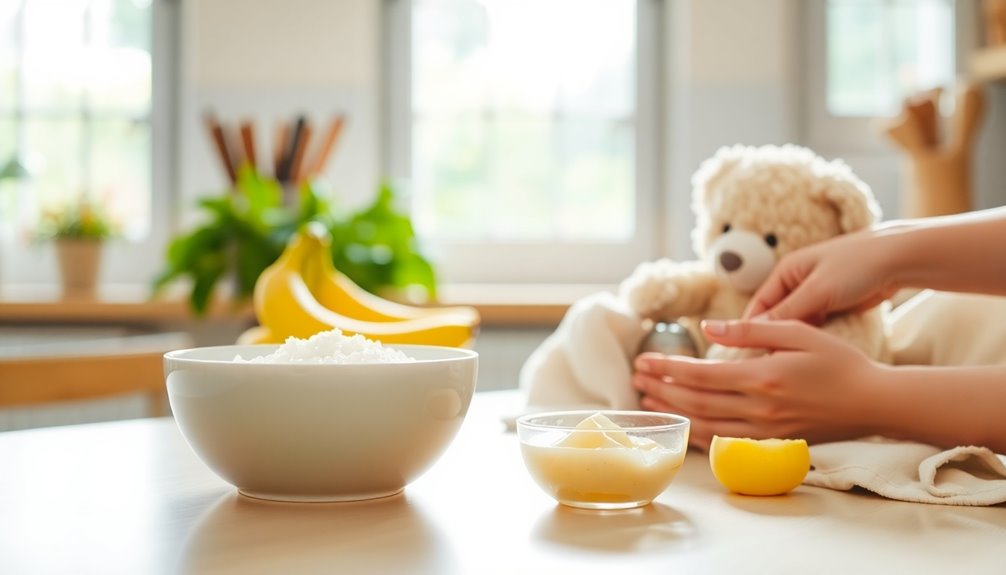
When your baby has diarrhea, keeping them hydrated is essential, and Oral Rehydration Solutions (ORS) can be a lifesaver.
Along with hydration, offering easy-to-digest foods like rice and bananas can help firm up their stools.
These simple remedies can make a big difference in your little one's recovery.
Hydration With Oral Solutions
Diarrhea in babies can lead to dehydration, making it essential to replenish lost fluids effectively. Oral Rehydration Solutions (ORS) are specifically designed to replace both lost fluids and electrolytes.
You should administer 2-4 ounces (60-120 mL) of ORS after each large watery stool to maintain hydration levels. Remember, ORS shouldn't be the only fluid source for more than 6 hours; continue breastfeeding or providing formula to guarantee your baby gets adequate nutrition.
Watch for signs of dehydration, like a sunken soft spot on the head or decreased urine output, which indicate the need for prompt rehydration.
Avoid diluting ORS or mixing it with formula, as this can reduce its effectiveness in treating diarrhea-related dehydration.
Easy-to-Digest Foods
To help your baby recover from diarrhea, incorporating easy-to-digest foods into their diet can be beneficial.
The BRAT diet—bananas, rice, applesauce, and toast—is often recommended because these foods are gentle on your baby's digestive system and can help firm up stools.
Plain yogurt with probiotics can also aid in restoring healthy gut bacteria, especially lactose-free options if your baby has sensitivities.
Starchy foods like oatmeal and crackers provide necessary carbohydrates without irritating the stomach.
When introducing solid foods, make certain they're soft and well-cooked for easier digestion.
Don't forget, hydration is essential, so continue breastfeeding your baby or providing formula to maintain fluid balance and support recovery.
When to Seek Medical Attention

How can you tell if your baby needs medical attention for diarrhea? It's crucial to monitor your baby closely. If you notice any of the following signs, don't hesitate to call your pediatrician:
- Severe dehydration: Fewer than six wet diapers in 24 hours, sunken eyes, or lethargy.
- Persistent diarrhea: If diarrhea lasts more than a few days or is accompanied by a high fever (100.4°F for infants under 3 months; 104°F for older kids).
- Concerning symptoms: Blood in the stool or severe abdominal pain, which could indicate a serious health problem.
Additionally, watch for unusual behavior like excessive sleepiness or irritability, as these may signal the need to seek medical attention.
Dietary Considerations During Diarrhea

When your baby has diarrhea, maintaining proper nutrition and hydration is essential for their recovery.
Continue breastfeeding or formula-feeding to guarantee they get enough fluids and nutrients. Once solid foods are introduced, focus on starchy foods like rice, bananas, applesauce, and toast, often referred to as the BRAT diet, to help firm up stools.
Avoid fruit juices and high-sugar liquids, as they can worsen diarrhea and contribute to dehydration. Probiotics, especially from plain yogurt, may help restore healthy gut flora during this time.
For babies over six months, consider offering electrolyte solutions like Pedialyte, but remember they shouldn't be the sole source of hydration for more than six hours.
Prioritize these dietary considerations for your baby's well-being.
Preventing Diaper Rash During Episodes
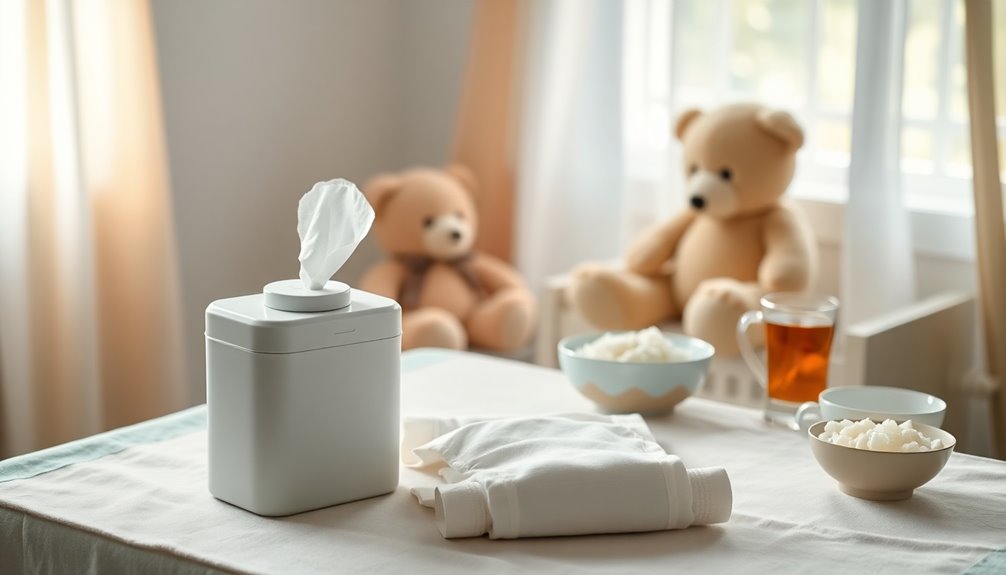
Keeping your baby's skin healthy during episodes of diarrhea can be just as important as managing their diet. To prevent diaper rash, follow these tips:
- Frequent diaper changes: Change your baby's diaper as soon as you notice soiled ones to keep the skin dry and free from irritants.
- Protective barrier ointment: Apply a protective barrier ointment like Vaseline or Desitin around the anus to shield the skin from moisture and stool.
- Super-absorbent diapers: Use super-absorbent diapers that wick away moisture, helping to maintain skin integrity.
Don't forget to keep monitoring for signs of severe diaper rash, such as redness or open sores, as these may require medical attention.
Importance of Hydration and Oral Rehydration Solutions

Since diarrhea can rapidly deplete your baby's fluids, staying hydrated is vital to prevent dehydration.
One effective way to achieve this is by using Oral Rehydration Solutions (ORS). These solutions are specially formulated to replenish lost fluids and electrolytes. You should give your baby 2-4 ounces (60-120 mL) of ORS after each large watery stool to maintain proper hydration.
However, remember that ORS shouldn't be your baby's only fluid for more than six hours. Continuing breastfeeding or formula feeding during this time is important to guarantee they receive enough calories and nutrients.
Keep an eye out for signs of dehydration, like decreased urine output and dry mouth, and seek medical attention if these symptoms worsen.
Monitoring Your Baby's Symptoms
Monitoring your baby's symptoms is essential, especially during episodes of diarrhea. You need to keep a close eye on the situation to guarantee your little one stays healthy. Here are key areas to monitor:
- Stool Frequency and Consistency: Track how many watery stools your baby has daily. Three or more indicate diarrhea.
- Signs of Dehydration: Look for fewer wet diapers, dark urine, dry mouth, or lethargy, as these may signal dehydration.
- Appetite and Behavior Changes: Note any decrease in feeding or unusual fussiness, which can indicate discomfort.
If you observe concerning symptoms like fever or persistent diarrhea, consult your pediatrician promptly. Staying vigilant helps maintain your baby's hydration and overall well-being.
Frequently Asked Questions
What Can Stop Diarrhea Fast in Babies?
To stop diarrhea fast in babies, focus on hydration first.
Keep breastfeeding or giving formula to prevent dehydration.
If your baby's old enough for solids, introduce starchy foods like rice, bananas, and applesauce, which can help firm up stools.
Consider using Oral Rehydration Solutions in small amounts after watery stools, but avoid sugary drinks.
Monitor for dehydration signs, and don't hesitate to seek medical advice if diarrhea lasts more than a couple of days.
What Is the Instant Solution of Diarrhea?
"When it rains, it pours," but don't worry—there are instant solutions for your baby's diarrhea.
Start by ensuring they stay hydrated with Oral Rehydration Solutions, giving 2-4 ounces after each large watery stool.
Keep breastfeeding or formula feeding, as these help maintain hydration and nutrients.
Avoid fruit juices and high-sugar liquids, and introduce easy-to-digest foods like rice and bananas when they're ready.
If diarrhea lasts over two days, seek medical attention.
What Electrolyte Is Good for Diarrhea in Babies?
When dealing with diarrhea in babies, you'll want to focus on electrolytes that help replenish lost fluids.
Oral Rehydration Solutions (ORS) containing sodium and potassium are effective options. Products like Pedialyte are specifically designed for this purpose.
You shouldn't dilute ORS with water or mix it with formula, as that can lessen its effectiveness.
Administering 2-4 ounces of ORS after each large watery stool can keep your baby adequately hydrated.
What Settles Diarrhea Quickly?
When it rains, it pours, but you can help settle diarrhea quickly.
Start with Oral Rehydration Solutions to replenish lost fluids and electrolytes. Keep breastfeeding or formula feeding to maintain hydration.
You can also introduce easy-to-digest foods like rice, bananas, and applesauce to firm up stools. Probiotics from yogurt can restore gut health.
Remember to avoid fruit juices and sugary drinks, as they can worsen symptoms and prolong recovery.
Conclusion
In summary, caring for a baby with diarrhea can feel like traversing a stormy sea. Just like a sailor adjusts their sails to weather the waves, you can ease your little one's discomfort by staying vigilant and hydrated. Remember, if the storm gets too rough—like signs of dehydration—it's time to seek medical help. By keeping a close eye on their symptoms and providing comfort, you're steering your baby back to calmer waters.
